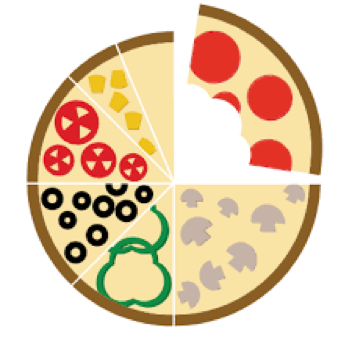Activities Section of the College Application: A Critical Piece of the Pie
By Lisa RatheCollege CounselingLet’s imagine your college application is like a pizza pie. It has separate pieces with different toppings, connected to a whole presentation on a platter. Although each piece will be consumed separately, the overall impression of the pizza is a result of the consistency and distinctiveness of the recipe and its lasting taste. The activities section of the college application is often a neglected piece that detracts from the overall product, instead of enhancing it with more flavor.
On the Common Application, a standard form accepted by over 750 colleges, students are supplied with 10 slots in which to list their high school activities beginning in the 9th grade. The number 10 is only a suggested amount and it is understood that not all lines are required to be filled. The central mission of this section is to have the students list the activities where they feel they have made the most impact. Fewer activities listed with descriptions of greater impact are more compelling to admissions officers than gratuitous involvement in an extensive list of clubs and groups. Honorary clubs like the National Honor Society should be listed under the honors and awards section of the application unless a student holds a leadership position requiring tasks and responsibility, in which case it could be an activity entry.
On this activity list, students will be asked to record in which school years they participated in these activities and for how many hours per week. These hours and years may very well comply with the order of importance based on impact recommended above. If not, impact still reigns as the ideal way to prioritize the list. Volunteering one hour a week after school for the Diversity Club, as noble as it is, will not be as impactful as affiliation with clubs where you held a leadership position or raised funds. Outside activities are valued and not to be underestimated. For example, if you babysit younger siblings, care for an elderly family member, or hold a part-time job, you are serving in impactful ways that are of great value to all colleges.
If you have ever created a resume, and I suggest you do as a helpful aid for filling out your college applications, you know how active verbs and tangible results are important for its effectiveness. And the Common Application only provides 150 characters in which to describe each activity, so use them wisely. One strategy for word conservation is to state your role in your organization in the top descriptive box of the activity, for example, Lifestyle Editor for Nationally Recognized School Newspaper. In the description box, you can expand upon your responsibilities, who you helped, how much money you raised, what you learned, and the legacy you left. Make sure not to repeat yourself and if you run out of space, edit areas of expertise you may be able to feature in other activities on your list.
Just as in a resume, use present tense verbs for activities in which you are still involved and use phrases instead of complete sentences. Use a variety of action verbs and try to practice parallelism. When you are listing responsibilities, for example, make sure you use consistent verb/noun combinations. An example would be: Responsible for brainstorming, revising, and supervising articles. Be as detailed as possible without exaggerating or fabricating your level of involvement. If there is a website for the activity, club, or fund, add the link.
Modesty and humility are admirable qualities. However, not articulating the excellence of your extracurricular life is a missed opportunity with potentially serious consequences. A student from the Haddam/Killingworth, Connecticut area who was very involved in her youth ministry program at her church listed her summer mission trip as an activity on her application. As a description, she simply wrote, “went to Worcester, Massachusetts.” After some consultation, she later added how she tutored illiterate adults, coordinated outside activities for a group of ten children ranging in ages of 2 to 4 at a day-care center, and managed the distribution of goods and clothes to the homeless. This key elaboration showcased her energy, dedication, and devotion to a cause and her commitment to others. When college staff are given the important task of selecting a student body that will get involved, contribute, and exhibit good citizenship and leadership skills, you as an applicant must capitalize on the activities section to build your case for admission.
Director of College Counseling
Lisa is dedicated to helping students maximize their potential and perfect their self-promotion to increase their options of admission into right-fit colleges that meet their financial needs and academic expectations.
full bio


